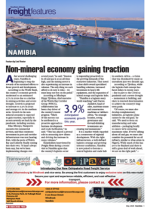As Namibia moves closer to final investment decisions in its promising oil and gas sector, the urgency to fast-track infrastructure development in Lüderitz is growing. According to Nico Oberholzer, executive of iLogistics Lüderitz, the port infrastructure is currently under significant strain, with increased volumes of oil and gas cargo, bulk and infrastructure project cargoes.“iLogistics Lüderitz combines decades of mining-sector roots with specialist oil and gas logistics expertise – acting as the local agent for Logistics Support Services (LSS), coordinating all vessel calls, cargo handling and onshore support operations out of Lüderitz,” he said. “Yet despite managing growing volumes of platform-supply, bulk and infrastructure project cargoes, the port’s 500 metres of quay and lack of dedicated berths for oil and gas support vessels means that passenger, ro-ro, container, bulk and breakbulk traffic all take priority, creating critical bottlenecks that threaten to delay time-sensitive drilling campaigns.”The challenge is that the oil and gas sector operations leave little room for delays. According to Oberholzer, platform supply vessels (PSVs) are utilised to service the rigs during drilling campaigns, and berthing delays are not conducive for such operations. “Timing is everything in this sector. The goal is to disrupt drilling as little as possible. Currently, neither Lüderitz nor Walvis Bay ports have dedicated space for PSVs involved with oil and gas operations,” he said.Concerns are growing that Namibia could miss out on significant opportunities in the oil and gas sector if it fails to address port infrastructure challenges swiftly. According to industry analysts, Namport’s plan to extend the quay in Lüderitz by 250 metres may not be enough to seize the potential. There are also concerns it may happen too late, especially when indications of a potential Final Investment Decision (FID) are quoted as being in the first quarter of 2026. LV

